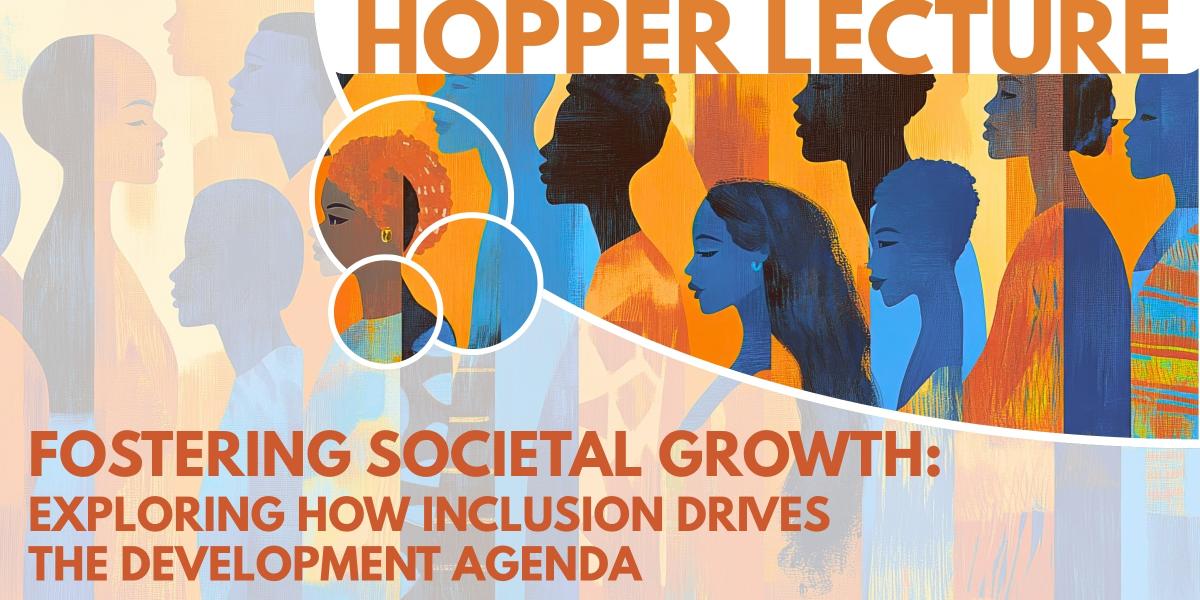The Annual Hopper Lecture is made possible through the generous sponsorship of the International Development Research Centre (IDRC) in honour of its founding president, David Hopper, who served in that role from 1970-1978. Each year, an eminent international thinker provides a free public lecture about critical current and future issues in international development at the University of Guelph and a second Canadian university.
The Hopper Lecture represents a unique long-term collaboration between IDRC and the University of Guelph – the only collaboration of its kind in IDRC's history. It also celebrates the many significant connections between the two institutions. In 1957 after the completion of his PhD, David Hopper obtained his first academic appointment as Associate Professor of Agricultural Economics at the University of Guelph, prior to subsequent positions with the Ford Foundation, Rockefeller Foundation, IDRC and the World Bank.
At the time of the creation of the Hopper Lecture endowment in 1993, three former governors of IDRC had been faculty members at the University of Guelph: Lila Engberg (long-time faculty member in family relations), Janet Wardlaw (first female Associate Vice-President Academic) and Bill Winegard (president of the University of Guelph from 1967-1975). More recently, Dominique Charron, who served as IDRC's Vice-President of Programs and Partnerships from 2019-2023, obtained her Doctor of Veterinary Medicine (1990) and PhD in Epidemiology (2001) from the University of Guelph. Mary Anne Chambers, the University of Guelph’s current Chancellor, was a member of IDRC's Board of Governors from 2017-2022.
The University of Guelph and IDRC are proud to support the Hopper Lecture, which provides an important opportunity to share cutting edge research about international development and engage with the Canadian public about global issues.
Guest speaker Ms. Kerryann Ifill is a well-known Barbadian activist who has ceaselessly promoted the rights of people with disabilities. Since losing her vision at the age of four, the 50-year-old has gone on to become the youngest person and first woman to be appointed President of the Barbados Senate. This was after becoming the first person with vision loss to complete a University of the West Indies degree (with Honours) at UWI's Cave Hill campus, before completing a Master of Business Administration and postgraduate diploma in Special Education.

Previous Lectures
2024 – Nanjala Nyabola – Restless Earth
2023 – Dr. Leanne Betasamosake Simpson – Theories of Water
2022 – Dr. Naila Kabeer – The Broader Story of Progress: Building Collective Actions on the Margin, Gender Perspectives from South Asia
2021 – Dr. Caroline Shenaz Hossein – The Future of Cooperation: Acknowledging Black Feminist Economies in the Global South and Beyond
2019 – Dr. Ramachandra Guha – Gandhi, Environmentalism, and the World Today
2019 – Dr. Patricia Romero-Lankao – Sustainable Cities: Enhancing Sustainable Transitions Through an Understanding of Risk
2017 – Dr. Duncan Green – How power analysis and systems thinking transforms the understanding and practice of change
2016 – Simon Maxwell – Finding a place of one's own: development agency choices in a new landscape
2014 – Dr. Anil K. Gupta – Empathetic Innovations for Inclusive Development: Can we learn from Grassroots Innovators?
2013 – Dr. Saskia Sassen – Emerging Logics of Expulsion & Surveillance: Where Does it Leave Democracy?
2012 – Helen Mack Chang – If You Can't Beat Them, Join Them: Defending Human Rights by Promoting the Strengthening of State Institutions
2011 – Dr. Roy Culpeper – Financial sector policy and development in the wake of the global crisis
2010 – John Githongo – Rethinking governance in Africa: a personal story
2009 – Dr. Richard Sandbrook – Alternative Development Strategies in an Era of Ideological Flux
2008 – Ratna Kapur – The Dark Side of Human Rights: A Postcolonial Reflection
2007 – Dr. David Mosse – What use is Anthropology to International Development?
2006 – Ravi Srivastava – Expanding Social Security in a Neo-Liberal World: India's Tryst with Rights-Based Approaches
2002 – John Stackhouse – Why No One Cares About the Poor: The Mass Media's Role in Poverty and its Perceptions
2001 – Nafis Sadik – Investing in Peace & Demography, Gender, and Reproductive Health
2000 – Niels Roling – Gateway to The Global Garden: Beta/Gamma Science for Dealing with Ecological Rationality
1999 – Francisco Sagasti – The Future of Development Cooperation: Gradual Evolution or Radical Break?
1998 – Joanna Kerr – Women's Right in the Global Economy: Can Feminists Transform Development?
1997 – Martin Khor – Is Globalization Undermining the Prospects of Sustainable Development?
1996 – Vaclav Smil – Who Will Feed China? Concerns and Prospects for the Next Generation
1995 – Lydia Makhubu – Africa's Development Dilemma on the Eve of the 21st Century: The Role of International Cooperation
1994 – Gerald K. Helleiner – Poverty in the South: Northern Responsibilities and a Role for Canada
1993 – Vandana Shiva – Understanding Threats to Biological and Cultural Diversity
